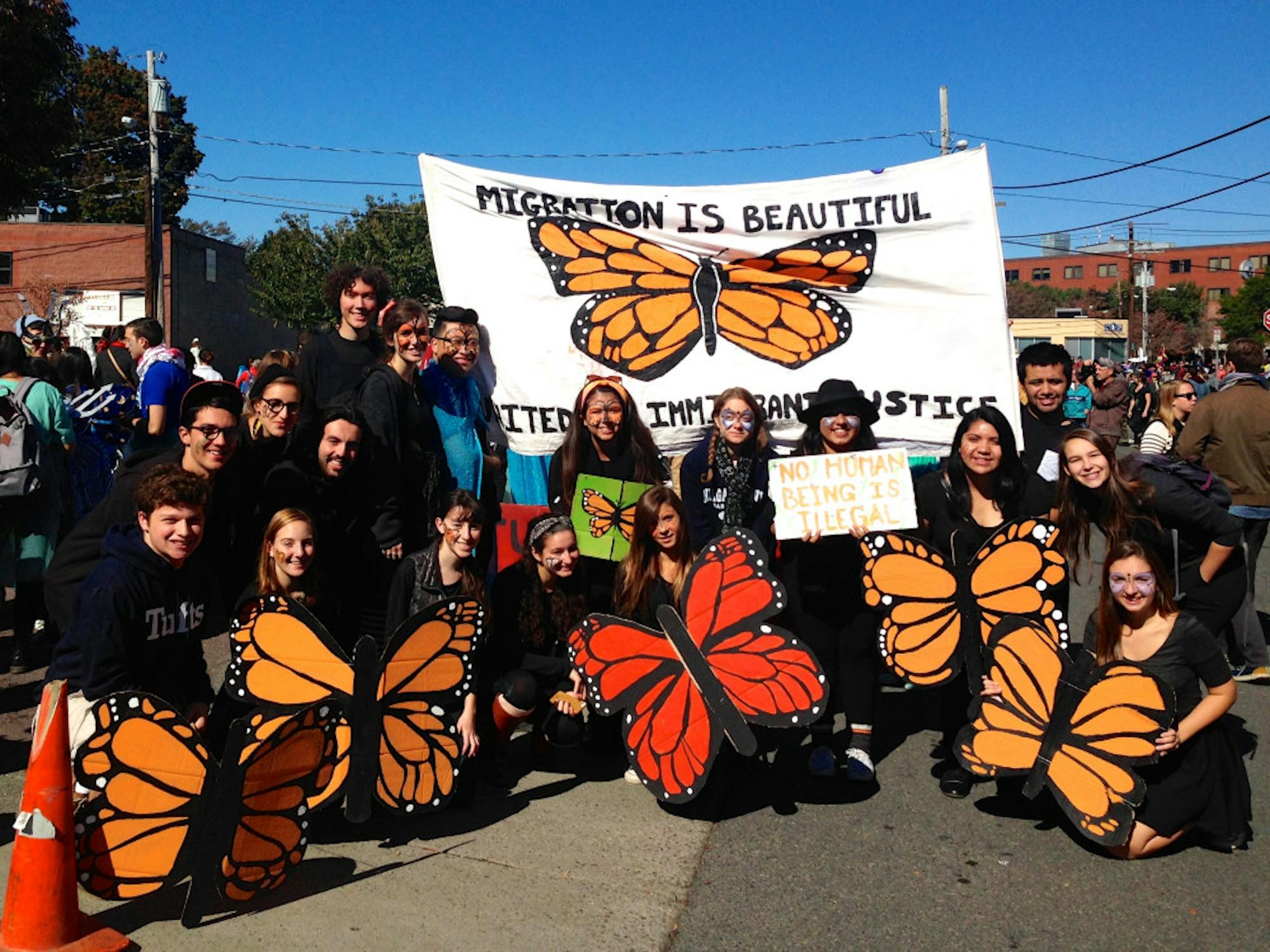Tufts United for Immigrant Justice (UIJ) has recently taken major steps to pressure the university into providing clear and accessible support for undocumented students in the application process and throughout their time at Tufts.
UIJ’s "Resolution to Establish Equal Opportunity for Undocumented Students," which the Tufts Community Union (TCU) Senatepassed 27-0-1 on Nov. 16, urged the administration to consider undocumented students as domestic rather than international students and to readily provide “an explicit, uniform admissions policy and a need-based financial aid policy” for undocumented applicants, according to the resolution.
UIJ also released a series of open letters to various administration officials and to the Tufts community, one of which ran in the Daily on Nov. 18. The letter featured the personal stories of three prospective and current undocumented Tufts students and insisted that the administration adopt the measures requested in the Senate resolution.
UIJ President Zobella Vinik explained that the next step is to work toward securing meetings with administrators to further the implementation of the resolution. To this end, UIJ has also released a petition to add additional weight to the resolution, she noted.
Vinik, a senior, explained that depending on the initiative's progress into next semester, UIJ will begin taking direct action. This would include holding rallies and protests that would aim to continue to highlight the barriers facing undocumented students.
“It’s an urgent issue affecting people right now,” she said.
According to Vinik, the Office of Undergraduate Admissions believes there are fewer than five undocumented students attending Tufts, but she noted that barriers to application and a lack of institutional support for undocumented students make it difficult for them to attend college.
Under Tufts’ current policy, undocumented students must apply as international students, which prevents them from receiving the financial aid that is almost always necessary for them to attend Tufts, according to the resolution.
While the administration is planning to introduce accommodation for students with Deferred Action for Childhood Arrivals (DACA) status, DACA’s many shortcomings make it a poor means of identifying undocumented students in the Tufts application process, according to Vinik.
For example, undocumented students with DACA status must renew their application every two years and pay a $465 fee with each renewal, Vinik added.
“There’s a financial gap in who can do it,” Vinik said.
Vinik added that only 46 percent of applicants for DACA status in Massachusetts receive the status, and that its specific requirements prevent many undocumented students from qualifying in the first place. Furthermore, she noted that many undocumented youth and their families are reluctant to give information about their immigration status to federal authorities.
UIJHistorian Joanna Dimas, who is from California, said she witnessed many of her undocumented friends struggle with or fail to complete the college admissions process.
“I saw the barriers they faced when they were applying to universities,” she said.
Dimas, a sophomore, emphasized that undocumented students need support from the administration throughout their college career -- not just in the application process.
From selecting classes to managing a four-year plan, undocumented students are often unsure of how to navigate the college atmosphere where most students either possess U.S. citizenship or are international students with visas, she noted.
“It’s one step to bring and accept undocumented students and to provide financial aid, but you have to take a further step,” Dimas said. “Once they’re actually here, it’s difficult to adjust.”
Many colleges and universities have already implemented ways to assist undocumented students both with their application processes and throughout their university careers. Harvard University, for example, provides a guidance counselor who is specially designated to help undocumented students, according to Dimas.
Vinik noted that it was helpful for members of UIJ to meet with the student groups at those institutions who worked to bring these changes to fruition.
“Most [of these initiatives] were started by students,” she said.
In some cases, administrators and even local politicians were particularly supportive of the changes, Vinik added.
UIJ began working with the TCU Senate Cultural, Ethnicity and Community Affairs Committee in early November to bring the resolution to completion, according to Vinik. She observed that the resolution received broad support from several student groups as well as from many TCU senators.
Diversity and Community Affairs Officer Allison Aaronson said that because many student groups feel overwhelmed by Senate procedure, she and other senators helped UIJ prepare for its presentation of the resolution, in part by inviting it to attend a Senate meeting.
Aaronson, a sophomore, commended UIJ for strongly demonstrating the barriers Tufts presents to undocumented students and the need for Senate action on the issue.
“They filled the room with people to echo support [for the resolution],” she said. “They showed Senate that this was important, and they really did their research.”
According to Vinik, UIJ aims to clear up misconceptions that students and administrators may have about undocumented students attending college.
“Once people learn about it, it makes sense to support it,” she said.
Many Tufts students are not aware of the challenges undocumented students face in applying for and attending college, Vinik added.
“The student body doesn’t think about this issue, so it doesn’t really understand the reality of being an undocumented student,” she said. “[Tufts] isn’t held accountable because it’s not perceived as an issue.”
Vinik noted that social justice movements at Tufts and at other universities in the United States often do not recognize the privileged position associated with possessing U.S. citizenship.
“[Speaking] as a white student citizen, we need to start realizing that citizenship is a privilege,” Vinik said.
Students urge administration to support undocumented students






